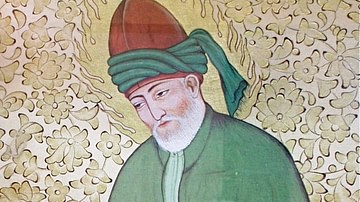Search
Did you mean: Script?
Search Results

Definition
Predynastic Period in Egypt
The Predynastic Period in Ancient Egypt is the time before recorded history from the Paleolithic to the Neolithic Age and on to the rise of the First Dynasty and is generally recognized as spanning the era from c. 6000-3150 BCE (though physical...

Definition
Ancient Egyptian Vizier
The vizier in ancient Egypt was the most powerful position after that of king. Known as the djat, tjat, or tjati in ancient Egyptian, a vizier was the equivalent of the modern-day prime minister of the nation who actually saw to the day-to-day...

Definition
Abu Bakr
Abu Bakr (l. 573-634 CE, r. 632-634 CE) was an early convert of Islam; he was a close friend and confidant of the Islamic Prophet Muhammad, and became the first caliph of the Islamic empire – a successor to Muhammad's temporal position but...

Definition
Nanna
Nanna (also known as Nannar, Nanna-Suen, Sin, Asimbabbar, Namrasit, Inbu) is the Mesopotamian god of the moon and wisdom. He is one of the oldest gods in the Mesopotamian pantheon and is first mentioned at the very dawn of writing in Sumer...

Definition
Book of Kells
The Book of Kells (c. 800) is an illuminated manuscript of the four gospels of the Christian New Testament, currently housed at Trinity College, Dublin, Ireland. The work is the most famous of the medieval illuminated manuscripts for the...

Definition
Ostrogoth
The Ostrogoths were the eastern tribe of the Goths (a Germanic people) who rose in power in the area north of the Black Sea. The designation, Ostrogoth, taken to mean 'Eastern Goth', actually means 'Goths glorified by the rising sun' and...

Definition
Kingdom of Mercia
The Kingdom of Mercia (c. 527-879 CE) was an Anglo-Saxon political entity located in the midlands of present-day Britain and bordered on the south by the Kingdom of Wessex, on the west by Wales, north by Northumbria, and on the east by East...

Definition
Rumi
Jalal ad-Din Muhammad Rumi (also given as Jalal ad-did Muhammad Balkhi, best known as Rumi, l. 1207-1273 CE) was a Persian Islamic theologian and scholar but became famous as a mystical poet whose work focuses on the opportunity for a meaningful...

Definition
Enlil
Enlil (also known as Ellil and Nunamnir) was the Sumerian god of the air in the Mesopotamian Pantheon but was more powerful than any other elemental deities and eventually was worshiped as King of the Gods. He is featured in a number of important...

Definition
Nephthys
Nephthys was one of the original five gods of ancient Egypt born of the union of Geb (earth) and Nut (sky) after the creation of the world. She was the fourth born after Osiris, Isis, and Set and was the older sister of Horus (usually referred...